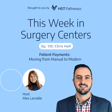Podcast Introduction & Format
00:00:01
Speaker
Welcome to This Week in Surgery Centers. If you're in the ASC industry, then you're in the right place. Every week, we'll start the episode off by sharing an interesting conversation we had with our featured guests, and then we'll close the episode by recapping the latest news impacting surgery centers. We're excited to share with you what we have, so let's get started and see what the industry's been up to.
00:00:27
Speaker
Hi, everyone. Here's what you can expect on today's episode.
Regulatory & Certification Process for New Surgery Centers
00:00:31
Speaker
Biatic Canby is a principal and partner at Left Coast Healthcare Advisors, and she joins us today to talk about managing the regulatory and certification process while trying to open a new surgery center.
00:00:43
Speaker
So this is the fourth episode in our Dunovo series, and this topic was one of our most highly requested, as it can be so nuanced and there are just so many moving parts. But Beata does a great job of breaking down the fundamental agencies to know, what order to get your certifications in, and tips for speeding up the process and staying organized.
News Recap: AI, Surgical Smoke, and Healthcare Policies
00:01:06
Speaker
In our news recap, we'll cover another research study that compared chat GPT responses to ophthalmologists, new surgical smoke evacuation requirements, UnitedHealthcare's new prior authorization requirements or lack thereof. And of course, end the new segment with a positive story about a woman who is severely paralyzed, but she got her voice and likeness back thanks to new technology that combines AI with a brain computer interface.
00:01:35
Speaker
Hope everyone enjoys the episode and here's what's going on this week in surgery centers. Hi, Bayada. Welcome to the podcast. Hello. Hello. Can you please share a little bit more about yourself and left coast healthcare advisors with our listeners? Yeah, sure. So my name is Bayada Canby.
00:01:58
Speaker
I have a background in hospital operations and strategy, but my real focus is construction in the built environment in the ASC space. So that's designing ASCs, getting them open, activating them, and that whole span of work. I've worked in both the US and Canada on hospitals and ASCs. And Left Coast Healthcare Advisors is a newer advisory firm that I am part of, a West Coast based
00:02:25
Speaker
And we do kind of soup to nuts ASC consulting. So operations, clinical process, legal and business structure, kind of everything ASC is our wheelhouse. Very cool. Yeah. I know Michael, your colleague was on one of the episodes recently as well. And so I'm really excited to sit down with you today because as you know, we've been talking to a lot of different industry experts and consultants about the process of opening a new surgery center.
00:02:53
Speaker
And whenever we do a poll of the audience on what they have the most questions about, it's always the regulatory and certification requirements and all the confusion and red tape and paperwork there. So could you provide some insight into why these processes at a high level are so important?
Navigating Licenses and Certifications
00:03:14
Speaker
Yeah, at a high level and really basically you can't perform cases, you can't open and you can't get paid unless you follow all the rules and get everybody on board and have all the right license. And the way that it's set up or the way that it works is there's really clear dependencies. So you can't get one without this other one. You can't get this one without this one. So it's not just getting the right licenses, it's getting them in the right order. So for example,
00:03:42
Speaker
As part of the process, you need to do demonstration cases for CMS. You can't do those without your state license and you can't do them without a DEA license. Another example, you can't get an insurance to credential you without a state license so that all the different pieces and then the order are critical. Sure.
00:04:01
Speaker
Yeah. And I feel like that is the most stressful part for somebody going through the first time is like, what do I do first and where do I begin? So you've mentioned a couple of these, but what are the fundamental agencies to look for regulatory accrediting bodies that really drive this process? Yeah. I like to say there's lots of cooks in the kitchen when it comes to ASC regulatory, the regulatory gauntlet. And I would like to say it's a short list or there's some that are more important than others. There aren't.
00:04:31
Speaker
So it starts with your local construction and inspections department, and that'll be based on your city or your county. And then there's also local business and tax agencies. Then you can go up, depending on your state, you may need a certificate of need, which can be a long and complex process. Then you get to your state licensing board, which could be Department of Health, Department of Licensing, the Department of Occupational Health and Safety, very state dependent,
00:05:00
Speaker
There's also attorney general and health authority notification bodies, CMS, DEA, then third party accrediting agencies. So those would be, for example, AAAHC, Joint Commission, QuadASF. If you're doing imaging or nuclear medicine, there's a whole nother set of regulatory agencies you have to go through. And then insurance payers.
00:05:27
Speaker
So it's a long list of folks that need to be involved in your regulatory review.
00:05:33
Speaker
Yeah, definitely. And I just feel like for the average physician or group of physicians trying to go through this, it must be so overwhelming if you've never gone through this before. And I would imagine at this level, there's probably so many different consultants and advisory groups that you can turn to for help. And I also feel like no one should feel crazy for knowing the order or where to begin.
00:06:00
Speaker
A hundred percent. It is complicated. It is, I'm going to say it, it's difficult. And if you get one piece wrong, it can put it all in jeopardy. And it's this crucial time at your ASC where you may have the keys, but you can't start generating revenue. So it's just, it feels like you're just spending cash. So you want to do it efficiently as possible. Yeah.
00:06:26
Speaker
Okay. So with so many agencies involved in so many moving parts, how can you organize it and where do you suggest people
Organizing the Regulatory Process
00:06:34
Speaker
begin? I think that sequencing and planning key. So where you start is either with a pen and paper or MS project or smart sheet, and you got to write it all down. You have to write down every agency that will have to be involved depending on your state and your location.
00:06:54
Speaker
And then you've got to map out the durations and the dependencies. So you end up with this big Gantt chart of here's what I have to do. And it is unique location to location. So it's not like you can go online and download, you know, key to opening a surgery center in Kentucky. It's going to be different depending on your locality. The way I like to think of it is start local and expand out.
00:07:21
Speaker
So start with that local agency that is your local construction and inspection department, and your contractor should support you in that. Then expand out to local business and tax, then go to the state, then go federal. It's just a nice way to organize your thought process, but definitely write it all down.
00:07:40
Speaker
Write down the cost for each because that's important to consider is the licensing fees and all of that. And then the next thing is reach out to the agencies, reach out to the department of health, reach out to your local construction and inspection department, start to build those relationships. It really helps to know who to talk to and you can find all those contacts usually online. Then ask colleagues, ask people locally or nearby, you know,
00:08:08
Speaker
what their experience was, how they did it. And most importantly, ask them about timing and delays in your local market. Another great resource for getting that information is local conferences.
Understanding Deemed Status in Healthcare
00:08:20
Speaker
So local ASC conferences, they have that very localized knowledge and they'll also have potentially support around that, but talk to people because you're not the first person doing this. And there's people out there that might be able to give you tips and tricks.
00:08:35
Speaker
Yeah. And with the conferences, I would imagine the state ASC associations can probably offer some level of support or at least say, Hey, I know so-and-so just opened their surgery center last year. Let me put you in touch with them. And I, but I think that's great guidance conceptually start local branch out because that's probably confusing too. Like should I go right to CMS or, you know, what do I do here? Yeah.
00:09:03
Speaker
Okay. So let's talk about deemed status. Can you share what that is and how it could maybe help simplify the process? Yeah. So deemed status is the term that's used for when CMS contracts with an accrediting body to perform the regulatory function. So CMS will contract with let's say AAAHC and AAAHC will do all of the review
00:09:33
Speaker
And AAAHC will do your onsite survey. So it's like a third party way for CMS to do things. And what I would call out is that it varies by state, what those accrediting agencies that CMS works with are, and the process for doing it. So a quick example, in Washington state today, you have to go deemed status. There is no other option currently in Washington.
00:10:00
Speaker
So you're kind of forced into a relationship with AAAHC or an accrediting body in order to get your CMS certification. And that's kind of a relatively recent change. You know, some organizations are like, well, I don't want to be accredited. You have to in Washington state these days. You can let that accreditation lapse in the future if your insurance contracts let you, but you have to go deemed status. Gotcha.
00:10:27
Speaker
Question. If you don't have that accreditation, does that have any impact on the surgery center long term? Does it help with payer negotiation rates or anything? What could it do?
Steps to Open a New Surgery Center
00:10:39
Speaker
Yeah, so accreditation is it's a strategic decision. Now there's some things you have to check certain insurance payers require accreditation. So if you want to be contracted with that payer, you have no choice.
00:10:52
Speaker
Certain States, like I mentioned, require you to be accredited to get that CMS. But there are some organizations that choose not to because of financial reasons, you know, there's annual fees involved and things like that. It really is a choice. And there are several accrediting bodies out there that you can pick from, but it really is a choice on just how you want, you know, a lot of surgery centers will put it on their website that they're quad ASF certified or triple AHC or joint commission. Yeah. So it's just a way to stamp your quality and that you've been surveyed.
00:11:23
Speaker
We deem status, simplifies the process a bit, but it's not a simple process. You know, when I think of it, there's 10 steps at a high level and they're pretty much in order, but at the same time, sometimes depending on your state, you can do two concurrently or you can switch them around a little bit. So the very first step is you have to get your local certificate of occupancy.
00:11:46
Speaker
That document, and if you're building new or a TI, your contractor will help work with you to get that. That's usually issued by a fire department, and it says you're okay to have human beings in this space working. So you have to have that in order to occupy the building. Next up, if your state requires a state license, you got to get your state license. Some states don't require a state license, but most states do. Next up, you apply for your facility NPI.
00:12:15
Speaker
So that's a fairly simple process to get a facility level NPI. The fourth step is you submit your applications and you submit your CMS application and your accrediting body application. And again, you can do that online. Once that application goes in, you should receive an approval letter from CMS. It may come from a company named Neridian or another company.
00:12:40
Speaker
They are regional organizations that work on behalf of CMS. Next up, I would say apply for your DEA license is the next thing you want to do. And there's a couple different ways to go about it. You can go straight to the feds and apply for a facility license. That's going to take you the longest. You can go straight to your local DEA office in person. That's what we do here in Seattle. We walk up to a desk.
00:13:07
Speaker
and we talk to a person. So if you've got a local DEA office, great way to expedite. The fastest and riskiest way to get a DEA license is to use your medical director's DEA license to procure drugs. But some doctors are not willing to do that because it does result in some additional risk for them because it's their personal medical DEA license that's then tied to the facility. So really best option, find a local DEA office and walk in.
00:13:36
Speaker
After you have that DEA license, the next step is to perform your 10 demonstration cases. So you have the drugs to be able to perform those cases. You may be able to do self-pay and get cash for those, but you can't bill insurance. So there's 10 cases that you got to do. Yeah. Can I ask a question about that really quick? How do you go about getting those 10? Is there any one way most people do it or any tips for getting those first 10 cases?
00:14:06
Speaker
In my experience, you ask the surgeons and say, hey, do you have a patient that you want to pull in for this period? Do you have a patient that you don't want to charge insurance for or that is able to do cash pay? So it's really sourcing with the surgeons and having them find the right patients. Gotcha. And do they typically disclose anything to the patient ahead of time? Hey, we're not that, you know, like, hey, we're just starting.
00:14:35
Speaker
Yeah. Like we're not fully open. We have to do these 10 cases. I think a lot of places do disclose to the patient at all. So the facility will be empty. So sometimes patients ask after you do those 10 demonstration cases, you want to notify CMS and the accrediting body of your onsite survey readiness. Once you have that it's an unannounced survey. So there's a couple of things there. So it's an unannounced survey.
00:15:04
Speaker
They must be able to observe a case. So this is where you have to let CMS and the accrediting body know of your opening hours. So let's say your business plan is to be open long-term steady state five days a week, all day long. During this period, you may say, we're only open on Mondays and Wednesdays from this hour to this hour. Because you have to have staff there because when the surveyor walks in, there's got to be somebody there.
00:15:32
Speaker
And so you got to be open and ready to go and you have to have cases running. So it's this kind of weird period. And managing those opening hours is key in communicating with the accrediting body that like, we're not open on Tuesdays, don't come on Tuesday. And then after the survey, they will either say, you're good to go, you passed, or they'll issue a plan of correction. If they issue these different level of findings. So you submit this plan of correction and say, here's how we're going to fix all the problems.
00:16:01
Speaker
But I would caution, if there's what's called a conditional finding, which is a more severe finding, you have to wait three months to resurvey. And so that can be a big delay. So you really want to make sure you're ready for that survey. And there are companies out there, we're one of them that will come in and do a mock readiness survey. Those are great. They test your staff, they test your operations. They're really useful to do mock surveys.
00:16:33
Speaker
Yeah, that's super helpful. And for our listeners, I will share this list in the episode notes. No one has to.
00:16:40
Speaker
scramble to take things down. But yeah, that's really interesting. We did an episode a while ago about that mock readiness survey, or also not even just a mock readiness survey, just doing mock accreditation surveys in general when you know your time is coming. And I thought it was really interesting too. And also, you know, being prepared for the moment somebody walks in with a clipboard unannounced can be
00:17:02
Speaker
very stressful, I would imagine, if you're not prepared. So that's really interesting. In your experience, has there been any like common conditional findings that people have found that have given them that three month delay? Or is that super rare? No, it's not rare. You know, this is where it really helps to talk to your network and your colleagues. Because every now and then the accredited body is kind of, they start focusing on something and there's different trends.
00:17:31
Speaker
Those conditional findings, often their life safety, their critical clinical patient care issues. Yeah. But they can be avoided by those mock surveys and testing yourself. Gotcha. Yeah. That makes sense. Okay. Switching gears a little bit. So we talked about payer contracts a week or two ago with your colleague, Michael, but walk us through the credentialing and privileging
Credentialing vs. Privileging in Healthcare
00:17:54
Speaker
piece of this. How is that different from payer negotiations? And what does this step really look like?
00:18:01
Speaker
Yeah, so there's two interactions at a high level that you'll have with insurance payers. One is negotiating your contracts. And that's what Michael spoke about previously, is getting your rates and your contracts in place. The other portion is credentialing. And you are required to credential with all the different payers. And both the facility and the providers must be credentialed. You must credential the facility first.
00:18:29
Speaker
And then the physicians add that new site to their professional list of sites served. So facility first, then the docs, you know, the estimated time to process these credentialing applications is 60 to 90 days, but that can vary by payer and locality. What I would say is start early, start as early as possible.
00:18:53
Speaker
Some payers will allow you to submit an early application even before your CMS and state licenses are complete. They may tell you they won't, but in our experience, if you push them a little bit, they'll let you submit everything and they'll just flag it that it's not ready for review yet, but at least you get it in. Some payers state by state have really onerous requirements for credentialing.
00:19:20
Speaker
The example I like to use is Michigan Blue Cross Blue Shield historically had a whole separate process called the evidence of need process that was rigorous. You basically needed to prove that there was need in the community in order to get that contract. Now that program is currently suspended. They haven't eliminated it, but it is suspended. And so that just means things change all the time with insurance payers.
00:19:47
Speaker
And then the second part is privileging and that'll happen at the facility level. And you need to make sure you have policies and procedures and bylaws in place to support that privileging to privilege different surgeons to do different procedures. But the credentialing process is just a lot of paperwork and you feel like, oh, I'm already working with a team on my contract negotiation. This is a different team that you'll work with.
00:20:12
Speaker
Got it. All the teams. All the people. Okay. Yeah. That makes sense. Now, zooming back out, what are some of the most common challenges that people typically encounter during this whole process that you've walked us through?
Challenges in Opening Surgery Centers
00:20:28
Speaker
I think the biggest one overall is delays and delays for things that are out of your control. So then I go back to your Gantt chart or your schedule.
00:20:40
Speaker
so that you can say, oh no, you know, our state department of health is running eight to 12 weeks behind. Not uncommon. Then you got to slide things around on that schedule. Another one in your contractor should help manage this. But for example, in Seattle, our construction and inspections department is running really behind post COVID. So like a plumbing permit can take months longer than you expected.
00:21:05
Speaker
which delays your certificate of occupancy. So again, talk to people, find out what those local delays are, and then have contingency plans and always go back to that plan. Another risk, and it's something to plan for upfront, is that this whole process, remember you're not generating revenue, but you're generating expense. You need to have staff there. You need clinical and business expertise available.
00:21:34
Speaker
You need project management expertise. You may need several bodies on site, possibly full time while you're not generating revenue. So make sure you've built that into your working capital assumptions because there's nothing worse than getting partially through the process and having to do a capital call with your physicians.
00:21:56
Speaker
Yes, I would imagine that is not a very fun conversation to have. And you've given us so much advice already, but if there is one piece of advice you would offer everybody to ensure a smooth journey through the regulatory and certification process, what would it be? Plan. Write everything down. Just at the beginning, write it all down. Write down every tiny step and make sure that you understand what comes first, what comes next.
00:22:25
Speaker
and all those dependencies. I think sometimes people go into it and feel that they can wing it and bounce from one to the other. You want a really good plan. Yep. That makes sense. All right. Final question for you. We do this every week with our guests. What is one thing our listeners can do this week to improve their surgery centers?
Improving Surgery Centers Through Staff Appreciation
00:22:46
Speaker
Yeah. So this one has nothing to do with regulatory and certification or credentialing. Walk your surgery center and thank your staff.
00:22:53
Speaker
Walk, walk the whole surgery center and say, thank you. Staff are critical. They're harder and harder to find. Staff is harder and harder to keep. Make sure that they know that they're appreciated and that you're setting up that culture of thank you. And then I would extend that actually out to your clinic office schedulers and make sure that they know that they're appreciated because they're critical at getting the cases in. So it's really as simple as saying thank you.
00:23:20
Speaker
I love it. That is great advice. Thank you so much for all of your time and expertise today. I really appreciate it. Yeah. Thank you. This was a great conversation.
AI's Impact on Ophthalmology
00:23:33
Speaker
As always, it has been a busy week in healthcare, so let's jump right in. A study conducted by researchers at Byers Eye Institute of Stanford University found that the chat GPT algorithm could accurately respond to patient queries related to ophthalmology, with specialists finding it hard to differentiate the chat bot's responses from those of their peers.
00:23:56
Speaker
So the study evaluated 200 iCare questions from an online forum and had eight ophthalmologists review the answers. And they were able to discern human from bot-generated responses with an accuracy of 61.3%.
00:24:12
Speaker
So the quality of the chatbot answers is of course on everyone's mind and what we're researching here. And they found that it was actually on par with human answers. The comparison they gave was that harm was deemed unlikely in 86.5% of the chatbot answers. And then harm was deemed unlikely in 84% of the human answers. However,
00:24:39
Speaker
The chatbot was prone to those occasional hallucinations that everyone keeps talking about and is most concerned about and which at times the hallucinations had the potential to cause harm. So for instance, it incorrectly stated that cataract surgery could decrease the size of the eye.
00:24:58
Speaker
So I think we can all agree that while AI and chatbots have the potential to decrease physician workload, they are not quite there yet to be left alone. And as we always say, this technology needs to be used in tandem with physicians to reduce the administrative burden, not in lieu of. But as these studies come out and as the machines have more data and more content fed to them,
00:25:23
Speaker
These answers are going to, in theory, become more accurate. So we'll keep the research coming your way, but that was just the latest in terms of ophthalmology. And of course they are the same research group as working on some upcoming projects, focusing on limiting those chatbot hallucinations, studying patient attitudes towards health advice generated by chatbots, and then of course any ethical issues regarding the use of AI in medicine as well.
New Surgical Smoke Evacuation Laws
00:25:51
Speaker
Our second story comes from the August edition of ASC Focus, and it's all about new surgical smoke evacuation requirements. Missouri Governor Mike Parsons signed HB402 into law, mandating healthcare facilities to adopt and implement policies and procedures for evacuating surgical smoke produced by energy-based devices during surgical procedures.
00:26:18
Speaker
And that law will go into effect January 1st, 2026. So for Missouri in particular, you have a little bit of time, but you will need to start preparing for this. 12 other states have enacted their own surgical smoke evacuation requirements with eight of them already in effect.
00:26:34
Speaker
And most of these laws are identical, requiring hospitals and ACs to prevent human exposure to the surgical smoke through the use of a surgical smoke evacuation system. However, Georgia and Louisiana's laws do not mandate the use of a surgical smoke evacuation system to get rid of the smoke. They just require that you do. So however you do it is fine with them. You just got to do it.
00:26:58
Speaker
And since 2016, 23 states have introduced 70 bills requiring the implementation of surgical smoke evacuation policies.
00:27:08
Speaker
And the association of perioperative registered nurses continues to push for surgical smoke-free operating rooms nationwide. And the reason is that the smoke can potentially contain harmful substances such as cellular material that includes viruses and bacteria, toxic gases, and carcinogens, and can cause respiratory problems, eye irritation, headaches, and nausea.
00:27:31
Speaker
So the moral of the story is as the push for surgical smoke-free ORs continues, we can expect to see more legislation in the near future. All right, switching gears to our next story.
UnitedHealthcare's Simplification Efforts
00:27:44
Speaker
As of September 1st, 2023, UnitedHealthcare will begin its two-phase approach to eliminating prior authorization requirements.
00:27:54
Speaker
The goal of the new rule is to eliminate prior auths plan-wide by 20%. So as of September 1st, codes will be eliminated for UnitedHealthcare Medicare Advantage, Commercial, Oxford, and individual exchange plans. And the September 1st elimination does include codes for several major procedures across various specialties, including gastro and spine.
00:28:21
Speaker
And then on November 1st, codes will be eliminated for the UnitedHealthcare Community Plan as well. So the driver behind this is that prior authorization is often cited as the largest burden in patient care by healthcare specialists, causing both states and payers to draft their own plans to eliminate requirements. And a rep from UHC shared, UHC is making the change in an effort to simplify the healthcare experience for our members and network healthcare professionals. Simple as that.
00:28:51
Speaker
And Andrew Lovewell, who's the CEO of Columbia Orthopedic Group in Missouri, shared that from his perspective, the prior authorization issues that we face every day with commercial payers is overwhelming. Many of the rules seemingly change day to day and the payer policies dictate provider decisions in a negative way many times. On top of that, many payer policies aren't up to date with new research and we are chasing old assumptions.
00:29:19
Speaker
So it's not often that the state, the physicians and the payers all agree on something and actually take action. So it will be very interesting to see how this reduction in prior auth requirements plays out.
AI Technology Enabling Communication for the Paralyzed
00:29:32
Speaker
And to end our new segment on a positive note, researchers at UC San Francisco and UC Berkeley have used technology known as brain computer interface to enable people with severe paralysis to communicate through a digital avatar.
00:29:49
Speaker
So the technology synthesizes speech or facial expressions from brain signals and can decode these signals into text at nearly 80 words per minute. Now this type of technology isn't new, but these researchers added in the help of AI to take it one step further.
00:30:07
Speaker
So the article shares the story of a woman named Anne who suffered a brainstem stroke that left her severely paralyzed. So Edward Chang and his team implemented a paper-thin rectangle onto the surface of Anne's brain and then trained the system's AI algorithms to recognize her unique brain signals for speech.
00:30:28
Speaker
The team then use old video footage to personalize the voice to sound just like Ann's did before her injury, and they personalized her avatar too. This type of research has the potential to transform the lives of people with severe paralysis, ultimately giving them hope and the ability to communicate as fast as we do and to have much more naturalistic and normal conversations, which is amazing.
00:30:54
Speaker
I highly encourage you to check out the episode notes and find the link to this story because the video is so heartwarming and it's really fascinating to see how it all works. And that news story officially wraps up this week's podcast. Thank you as always for spending a few minutes of your week with us. Make sure to subscribe or leave a review on whichever platform you're listening from. I hope you have a great day and we will see you again next week.




















